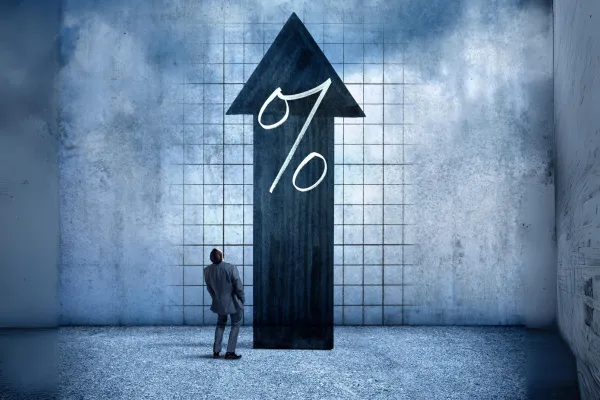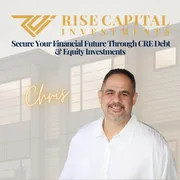Rise Capitals Articles To Educate And Inspire

Navigating the Real Estate Market Turmoil!
"Opportunities are usually disguised as hard work, so most people don't recognize them." - Ann Landers
The real estate market is notoriously cyclical, with periods of rapid growth often followed by downturns. Right now, rising interest rates are causing concern among investors. Higher borrowing costs can lead to decreased affordability, slowing down transactions and impacting overall market sentiment. So, how do you stay resilient and find opportunities during these market fluctuations?
Understanding the current market dynamics and recognizing the opportunities in different asset classes can give you a significant edge. By leveraging historical data and smart strategies, you can navigate through economic uncertainties and come out stronger on the other side.
Current Market Overview and Rising Interest Rates
The current real estate market is characterized by a mix of anxiety and opportunity. With the Federal Reserve implementing a series of interest rate hikes to combat inflation, the cost of borrowing has increased, affecting both residential and commercial real estate sectors.
Impact on Residential Real Estate
Higher mortgage rates have made it more expensive for buyers to finance home purchases, leading to a slowdown in home sales. However, this cooling effect could eventually balance out the market, reducing the competition and potentially stabilizing home prices.
Impact on Commercial Real Estate
In the commercial sector, rising interest rates can increase the cost of financing new projects and refinancing existing ones. This scenario might deter some investors, but it can also create opportunities for those with cash reserves or alternative financing options.

Different Asset Classes in the Current Market Cycle
Understanding where each asset class stands in the current market cycle is crucial for making informed investment decisions.
Residential Real Estate
The residential market is facing challenges due to higher borrowing costs, but there are still opportunities in undervalued markets or properties that offer value-add potential. Long-term investors can benefit from buying during a dip and holding through the cycle.
Commercial Real Estate
Commercial properties encompass a variety of asset classes, each responding differently to the current market cycle. Here's a deeper dive into the main categories:
Office Spaces
Office spaces are experiencing a significant transformation. The rise of remote work has decreased demand for traditional office space, leading to higher vacancies and lower rental rates in many areas. However, there is a growing interest in flexible office spaces and coworking environments. Investors should consider properties that can be repurposed to meet these new demands or those in prime locations where demand remains strong despite the shift.
Retail Spaces
The retail sector has been hit hard, primarily due to the accelerated shift towards online shopping. Many brick-and-mortar stores are closing, leading to increased vacancies and lower rental income. Yet, not all is bleak. Essential retail, such as grocery stores, pharmacies, and convenience stores, remains resilient. Additionally, experiential retail—stores offering unique in-person experiences—can still attract foot traffic. Investors can look for opportunities in transforming traditional retail spaces into mixed-use developments or focusing on niche markets that continue to thrive.
Industrial Real Estate
Industrial real estate is perhaps the most robust segment in the current market. Driven by the exponential growth of e-commerce, the demand for warehouses and distribution centers has surged. Properties near major transportation hubs are particularly valuable. Investors should consider industrial real estate for its strong fundamentals and potential for long-term growth, especially those properties that support the logistics and supply chain infrastructure.
Multifamily Properties
Multifamily real estate continues to perform well despite economic uncertainties. The increasing cost of homeownership is pushing more people towards renting, sustaining demand for rental units. Multifamily properties, especially those in urban areas with high job growth, offer stable cash flow and are less susceptible to market fluctuations compared to single-family homes. Investors can find opportunities in both existing properties and new developments, particularly those that offer amenities appealing to modern renters.
Mobile Homes and RV Parks
Mobile home parks and RV parks are gaining attention as affordable housing alternatives and lifestyle choices. These assets can provide steady income streams due to their lower maintenance costs and high demand for affordable living solutions. In the current market, where affordability is a significant issue, mobile homes and RV parks offer unique opportunities for investors. These properties tend to have lower vacancy rates and can be less sensitive to economic downturns, making them attractive for long-term investments.
Historical Market Cycles and Long-Term Investment Horizons
Historically, real estate markets have shown resilience over long-term investment horizons. Market cycles typically involve four phases: recovery, expansion, hyper supply, and recession. Understanding these cycles can help investors make strategic decisions.
Recovery Phase
This phase follows a downturn, with declining vacancies and no new construction. It’s a good time to buy undervalued properties.
Expansion Phase
Characterized by decreasing vacancies and new construction, this phase offers growth opportunities. Investors should be cautious of overpaying as the market becomes more competitive.
Hyper Supply Phase
During hyper supply, new construction outpaces demand, leading to increased vacancies. It’s a time to be selective and focus on properties with stable cash flows.
Recession Phase
Marked by high vacancies and declining rents, the recession phase can be challenging. However, it also presents opportunities to acquire distressed assets at lower prices.
Tips for Navigating and Thriving in an Uncertain Market
✔️Stay Informed: Keep up with market trends and economic indicators. Understanding the broader economic context can help you anticipate market shifts.
✔️Diversify Investments: Spread your investments across different asset classes and geographical locations to mitigate risk.
✔️Leverage Technology: Use data analytics and property management tools to make informed decisions and optimize operations.
✔️Focus on Value-Add Opportunities: Look for properties where you can increase value through renovations, better management, or strategic repositioning.
✔️Maintain Liquidity: Having cash reserves can help you seize opportunities that arise during market downturns and weather financial storms.
✔️Build Strong Relationships: Networking with other investors, brokers, and industry professionals can provide valuable insights and opportunities.
Navigating the real estate market during times of economic uncertainty requires a strategic approach and a deep understanding of market dynamics. By staying informed, diversifying investments, leveraging technology, and maintaining liquidity, you can not only survive but thrive in a volatile market. Remember, every market cycle presents unique opportunities—your task is to identify and capitalize on them.

